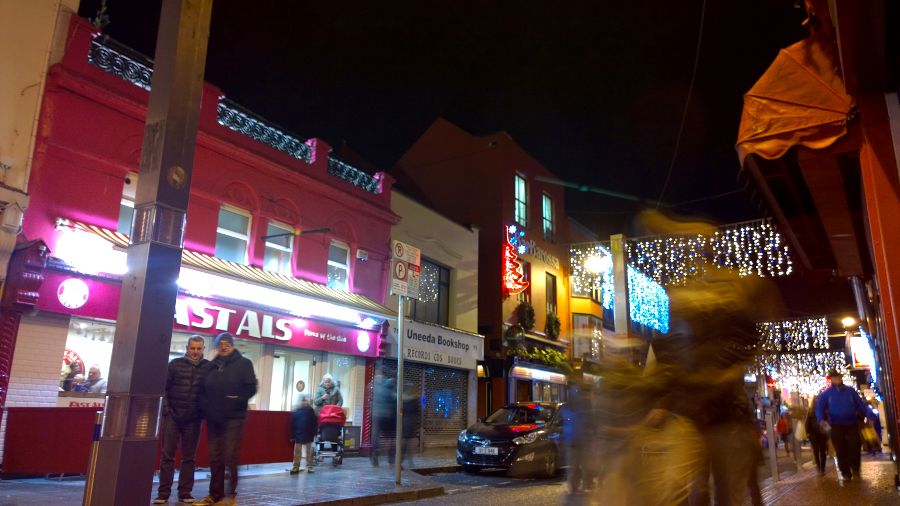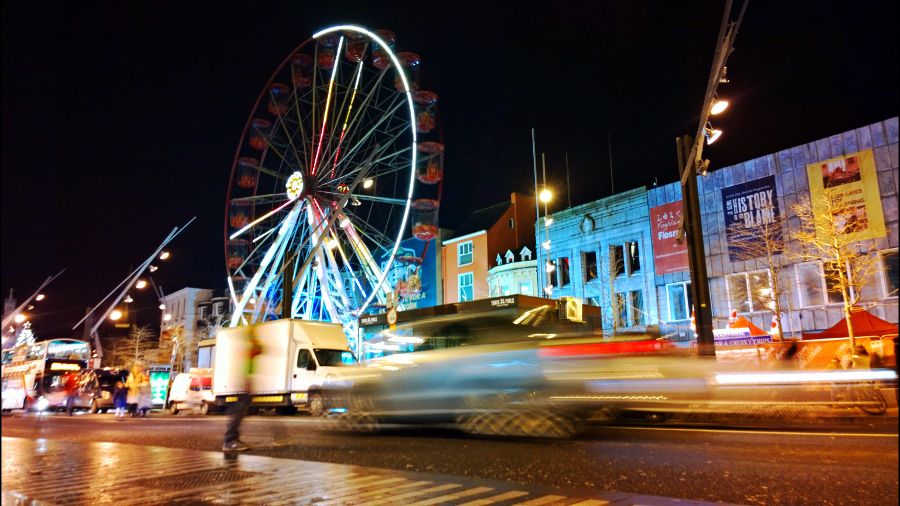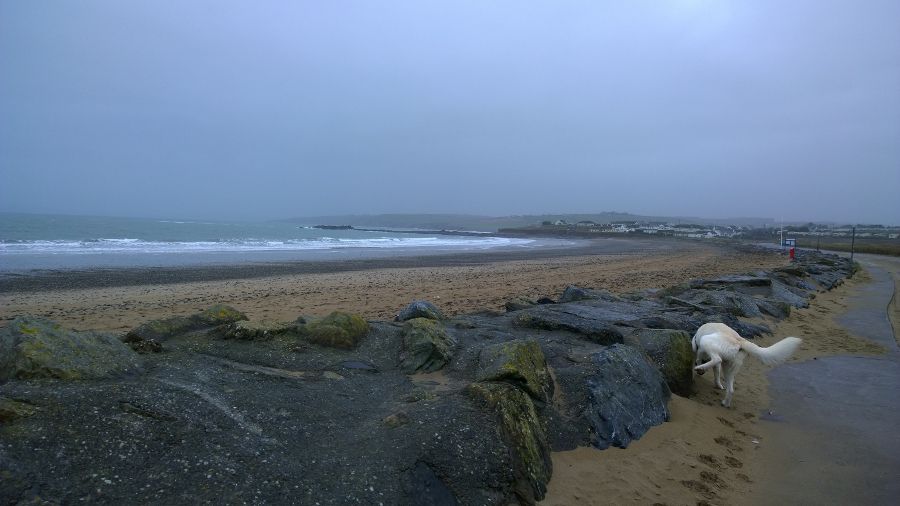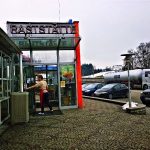…or how Croatians started to mingle in the Cork county.
Lidija Ivanek SiLa’s look at the Croatian experience in contemporary Ireland continues on February 6, 2016.
The first big obstacle to conquer when you become resident in a new country is the language. We both (my hubby and I) had previous knowledge of the English language, but that led us only halfway through the normal, social conversations. As I already mentioned, the Irish are very friendly, and very talkative people. On our first day we already met all our neighbours and one walk with our dog was enough for every middle-aged or elderly person that we’ve met to introduce us with the status of their family life. Even to the point that we heard life stories from birth to death of every single member of their family. We were immediately introduced to sons-in-law and marital statuses, rosy marriages or the marriage soon-to-be-terminated. Usually after a polite greeting: How are you, lovely day etc. they engage in a conversation like we are old friends. I got the feeling that we had already talked and that he or she just continues the conversation from the other day and I must be senile that I can’t recognise the person’s face.

Now, picture this. I was already confused with all those open conversations on the street, trying to figure out if I knew that person or not, then to my despair, they started to converse in a bit more relaxed manner, what I mean is that the Cork-ish accent is much, oh, much stronger. Now, usually when someone is explaining something to you it is polite to answer, but most of the time, I didn’t have a clue what they were talking about. I very quickly adopted the so called stupid-smile-face, trying to compensate luck of understanding with friendliness. It was completely useless to constantly ask: So sorry, can you repeat, I didn’t quite understand…
The misery of all miseries, the most friendly people were three local, elderly men. When an elderly men in county Cork speaks it is the worst speech you will ever hear! They swallow most of the syllables. The sound that comes out of their mouth sounds like mumbling. The older the man, the worse his oration sounds. The three men are neighbours, they live around one corner in a small, narrow street in Kinsale. They reminded me of the Dalmatian men in the afternoons, when the heat of the day is slowly settling down and they walk outside of the shades of their houses, sit on doorways, little corners, squares, in the narrow stony streets, so called kale, kalete.

So our dear three men where the first to welcome us in Kinsale and they were the first source of helpful information when we got in trouble with a punctured tyre. They were very patient with us, slowly repeating a couple of times how to get to the tyre service. But in a way, the trouble with understanding was mutual as they did have trouble to understand us as much as we had trouble to understand them. On the contrary, women in county Cork speak completely differently. They are delightfully understandable. The way they talk is open, with smiles, and the speech sounds well like a melody, compared to men. One of my experiences will paint a good picture about my non-understanding- men-speech. It happened that for a full month I was convinced about one guy that he is Irish true and true, the way he mumbled words in his chin. Finally, one day I asked him more questions, determined to find a way to communicate. To my complete surprise, I found out that he is actually Polish! A Polish guy who was struggling to speak English.
We had our laughs how commonly known things like names of the car brands here sound differently. For e.g. Hyundai in Croatia is pronounced – Hjundaj, but in Ireland it is pronounced – Hajundaj. Which sounds very funny if you are Croatian. The same thing happens with Peugeot – in
Croatian Pežo, in Irish – Pjužo. As we were listening to a Cork radio station and we were still newbies in Ireland, we heard the radio host saying that we can check the information on the page that sounded to us like this – orđi dot kom. We both heard the same thing and we were stunned.
Because orđi is very close to orgy and we thought what type of radio is that?! What?! How is that possible?! Every time the guy announced that web page, we were completely puzzled. Finally, on the local TV they repeated the same advert and this time we could see how it was written – it was rte.com! We are still laughing about that.

There is a story about the non-existent town called Raysdeen. Again one man, this time, a young man from Kinsale is the core of the story. When we were chatting on the street (where else!) with this man, my curious hubby asked him; Where were you born? – the guy answered and to my hubby it sounded like the name of the town – Raysdeen – that’s when he said: I am sorry but I am not that familiar with geography of Ireland, where is that town Raysdeen? Now, our young man was puzzled. There they are, in a node of misunderstanding, looking at each other with a question mark on their foreheads. Luckily, I recognised the source of all that confusion. What the young man said was actually – born and raised in… meaning here in Kinsale, which sounded like Raysdeen.
Sometimes I imagine myself as Sherlock Holmes – solving mysteries in communication and saving social conflicts.
I finally came to an understanding that the best way to learn the local language is to listen to the rhythm rather than trying to recognise the word. Because, Irish words have constant rhythm. With sensing the rhythm, the recognition and understanding comes.
The second thing that we did was going to dinners, lunches, brunches, barbecues etc. when we had time. Croatians are known for organizing all kinds of social events with a good meal, and even the best business deals are made behind the full table. Then it is no wonder that the best way to immerse yourself to the new culture is with food on the table. In one of those barbecue happenings that was organised by a Croat in Cork, where half of exYu nationalities mingled with locals, I was fortunate to sit across a very funny Corkonian (thanks to the fact that we both have dogs who needed to stay further away from those tasty sausages). Well, my dear conversationalist was a young, red haired, red bearded, medium sized man, you may say that he was a typical stereotype for Irish. I will call him Michael. The information that we came from Croatia unleashed in Michael’s memory an event that happened to him while he was on a holiday in Croatia.
As I noticed already, the usual place for Corkonians to go for a holiday in Croatia is Dubrovnik, and occasionally Zadar, rarely more northern e.g. Istria. So, Michael was in Dubrovnik with his girlfriend and his brother and his brother’s girlfriend. The four of them saw an opportunity to rent a boat and go to a nearby island for a short trip. There they are, arriving at the place to rent a boat, finding a local guy, sitting in his chair. When they addressed him, he stood up and by the story of our Michael, that Croatian fellow could be as a Greek god himself, tanned, tall, masculine, black hair, with everything perfectly arranged on his masculine chest. At that point, the story just begun and I was already laughing imagining our typical Dalmatian guy, salty, shiny tanned skin, with a body carved from swimming.
I started to laugh as I already knew that our medium sized Irish Michael got himself and his brother into a lot of trouble in front of the girls. So, the Dalmatian guy explained in two sentences to them, what he thought were instructions about how to drive a boat and pointed the finger vaguely into the direction where those boats were anchored. For Michael that distance seemed like the boats were anchored in the middle of the Adriatic Sea. The thing what Croatians will not consider, is that the average Irish is not a good swimmer, and actually there are a lot of them who cannnot swim at all. The ocean is not a friendly place for swimmers, the water is always cold, with constant waves and huge tides. Michael was uncertain what to do with that boat over there. As they stood there for some time, the Dalmatian guy finally noticed their confusion, he jumped into the water without spattering a single drop of water. As he dived in, he resurfaced again near the boat. For Michael’s bunch that seemed like an impossible distance to swim, and that guy dived with one breath, it seemed like with one swing of his hand. The sighing of the girls showed Michael that he made a terrible mistake and was about to lose the battle. The Dalmatian guy grabbed the anchor and tossed it over his shoulder. He lightly pulled the boat back to the shore swinging his black hair while getting out of the water.
While the face of the Dalmatian guy was lightly filled with contempt toward the boys, he gallantly offered his hand with the outmost beautiful smile on his glittering face to the girls, helping them to enter the boat. He turned his back to the boys, expecting them to enter the boat alone. Michael and his brother were mortified that if they jumped into the boat they will be embarrassed once more with some clumsy fall. Somehow they gathered courage and jumped. The boat shook heavily but all went well. The only thought they had was: Come on! Start the engine and move away from that place, far away from that guy. They pulled the starter cord on the motor, but nothing happened.
They pulled it again with all the strength they had and to their horror – nothing, no sound. Then suddenly the boat lightly shook and they knew the guy just jumped in. The guy pulled the starter cord and immediately they heard the known sound of a running motor.
Poor Michael I couldn’t let him stay with that conviction. I explained to him (after I stopped laughing) that not all Croatians are handsome, tall and athletic like that guy. That I don’t know what they eat down there on the south of Croatian coast, but Dalmatians are taller every year. I try to comfort him with the story about certain type of men in Croatia called Galeb (seagull). It’s the kind of guy that almost every woman could fall for. They prey on gullible ladies, usually foreigners, because local girls know how to deal with those type of men. Seagulls, those charming, handsome sweet-talkers are initiators of all the stories about short-lived summer romances, broken hearts and inspiration for romance novels.
The good thing was that this story happened to an Irish guy, because the Irish can and know how to take a joke without being offended, even to the point that the story became hilariously funny adventures to tell at parties. I don’t know if the girls stayed with the boys after the holiday, but those boys are heroes in my eyes.









